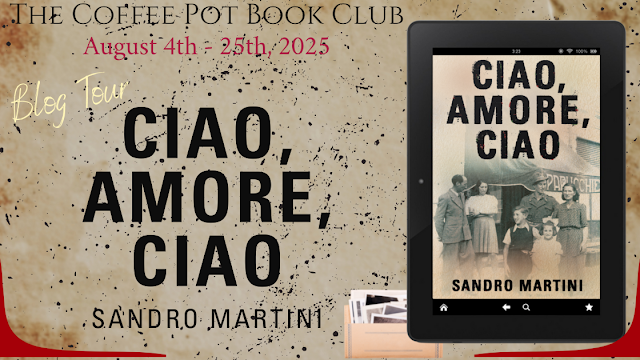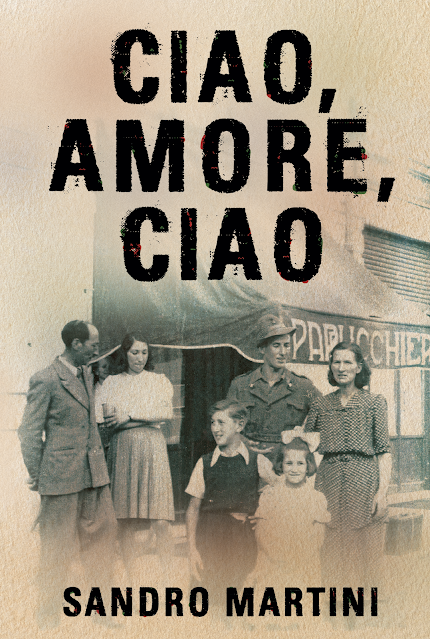Ciao, Amore, Ciao
(Alex Lago, Book #1)
By Sandro Martini
An enthralling dual-timeline WWII family mystery, based on the heartbreaking true story of the massacre in a small town in Italy in July of 1945, from award-winning, bestselling novelist Sandro Martini.
In the winter of 1942, an Italian army of young men vanishes in the icefields of the Eastern Front. In the summer of 1945, a massacre in Schio, northeastern Italy, where families grieve the dead, makes international headlines.
In present-day Veneto, an ordinary man is about to stumble onto a horrifying secret.
Alex Lago is a jaded journalist whose career is fading as fast as his marriage. When he discovers an aged World War II photo in his dying father’s home, and innocently posts it to a Facebook group, he gets an urgent message: Take it down. NOW.
Alex finds himself digging into a past that needs to stay hidden. What he's about to uncover is a secret that can topple a political dynasty buried under seventy years of rubble. Suddenly entangled in a deadly legacy, he encounters the one person who can offer him redemption, for an unimaginable price.
Told from three alternating points of view, Martini’s World War II tale of intrigue, war, and heartbreak pulls the Iron Curtain back to reveal a country nursing its wounds after horrific defeat, an army of boys forever frozen at the gates of Stalingrad, British spies scheming to reshape Italy’s future, and the stinging unsolved murder of a partisan hero.
Ciao, Amore, Ciao is a gripping story of the most heroic, untold battle of the Second World War, and a brilliantly woven novel that brings the deceits of the past and the reckoning of the present together.
Publication Date: March 26th, 2025
Series: Alex Lago Series, Book #1
Publisher: Black Rose Writing
Pages: 426
Genre: Historical Fiction
Praise for Ciao, Amore, Ciao:
“A gripping saga that roots excruciating betrayals in a nation’s tragic history.”
~ Kirkus Reviews
~ Kirkus Reviews
“Balances action, suspense, and emotional depth to deliver a truly immersive, thought-provoking read with an unflinching look at the sins of the past and the lengths to which the powerful will go to keep them buried.”
~ Sublime Book Review
~ Sublime Book Review
An Interview with Sandro Martini
What inspired you to start writing?
I was a sickly kid, and we didn’t have a TV when I was growing up. I spent a lot of time in bed listening to radio plays, and those voices and stories from faraway lands, they got me through some dark times, and their cliffhanger endings made me want to stick around for the next episode. I was inspired first by those plays and then, later, I discovered the world of action books in a little shop called Edna’s Book Swap where my mom would take me once a week to buy her Italian magazines. I became enamoured by the books in those aisles—particularly those old Corgi paperbacks by Desmond Bagley and Alistair MacLean, with their bright, all-action covers. When I got an Olivetti Lettera 32 typewriter for my eleventh birthday, I was on my way and wrote my first novel before I was a teenager.
What was the hardest part about writing this book?
Writing about my dad. I’d buried him the week before I began this novel, and he’s a character in Ciao, Amore, Ciao—the bond, in a way, to the whole thing. It was hard, trying to capture him with my words. In a way, I was keeping him alive, but I hardly remember writing that first draft. Maybe it was cathartic. But writing about him and my mom—I’d lost both in the space of ten weeks—was intense. I spent a over a decade researching this novel—trying to find out what happened to my uncle, who’d vanished into the Russian winter in 1943—but writing the novel wasn’t really something I’d planned. It’s a good thing I wrote it then, though, because I don’t think I’d have been able to do so a year later. You know, I got an email from a reader who told me he’d sort of relived the pain of losing his dad when he read my novel and thanked me for bringing up those memories of his family. There’s something raw and true in Ciao, Amore, Ciao that would not have been the same if I hadn’t written that fast draft when I did. But it was hard.
Does one of the main characters hold a special place in your heart? If so, why?
The main character is sort of me, since the novel is historical autofiction. So no … I’m not really a big fan! The character of Giulio though, who appears in the second timeline, is a fictional character that I created (actually, he kind of created himself) to bring the war part of the novel alive. For the war scenes, I wanted to use only the memories of survivors to retain the truth of what happened to them on the Eastern Front in 1942/3. The horror was such that I didn’t want to invent any of it: It would have been wrong to despoil the memories of those who were there. I had about a thousand pages worth of notes from countless articles and books and private interviews I’d conducted through the years. But Giulio is the character who “sees” the madness, and he just kind of popped into the novel completely unexpectedly, and became this cool, detached, brave guy that drove the war chapters. He’s probably the most interesting character I’ve ever written, and I’m not sure I even wrote him—he kind of wrote himself. He came fully formed, and his scenes hardly needed an edit after the first draft.
If your book was to be made into a movie, who are the celebrities that would star in it?
Oh boy. My first novel, Tracks: Racing the Sun, has had the movie rights optioned, and that would be an easier one to cast! I think the me character should be whoever is the hottest actor in Hollywood—or, if we could go back in time, maybe Alain Delon! But in reality, it would probably be Nic Cage in one of his more manic roles, he’d be ideal. And Jessica Chastain would make an excellent Sofia. Giulio would be perfectly cast as Marcello Mastroianni or Javier Bardem.
What do you hope your readers take away from this book?
Two things. The first is that war doesn’t have winners, just degrees of loss and shame. And the scars last generations. The second thing is that it’s okay for a man to break with grief. There’s more strength in a man breaking than in a man hiding and masking his emotions. Judging a man for being supposedly weak is a judgement not on him, but on those judging. Allowing yourself to feel the full force of losing those you love, that’s part of the process of living and healing and it’s what makes you human. Trying to hide from all that, it’s a betrayal of yourself, your own humanity, and ultimately a betrayal of those you loved. I know it’s cliché but here’s the thing the main character learns: That it was only because he was loved, and only because he was able to love, that he felt so much so pain. Love is kind of pain on credit, isn’t it. There can’t be one without the other. And being loved, and loving, is a blessing that is so rare in this world. In Ciao, Amore, Ciao, that love is contrasted by the horror of the war in the Eastern Front in Stalingrad where my uncle was lost, and it all makes for an emotional rollercoaster. Which, really, was where I was when I wrote that first draft.
Buy this Book
This title is available to read on #KindleUnlimited.
Sandro Martini
Sandro Martini has worked as a word monkey on three continents.
He's the author of Tracks: Racing the Sun, an award-winning historical novel. He grew up in Africa to immigrant parents, studied law in Italy, chased literary dreams in London, hustled American dollars in New York City, and is now hiding out in Switzerland, where he moonlights as a Comms guy and tries hard not to speak German.
You can find him either uber-driving his daughter, chasing faster cars on the autobahn, or swimming in Lake Zurich with a cockapoo named Tintin.
His latest historical suspense novel, Ciao, Amore, Ciao, is now available.
Social Media Links:










Thank you so much for your fabulous interview with Sandro Martini today, about his writing, and his compelling new novel, Ciao, Amore, Ciao.
ReplyDeleteTake care,
Cathie xx
The Coffee Pot Book Club